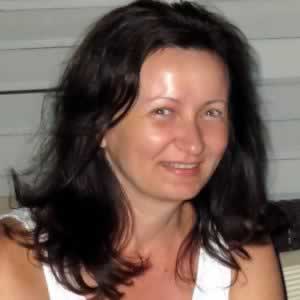Last Updated on: 20th October 2023, 07:37 pm
The average Everest Base Camp trek cost ranges between $2,000 and $4,000, depending on your chosen route, travel agent, lodging type and group size. Sleeping in luxury lodges can easily cost $200 per night. If you return by helicopter from Gorak Shep to Lukla or to Kathmandu, you’ll need to fork a few additional hundreds of dollars. Also, sleeping at the Everest Base Camp for one or two nights will add several hundreds of dollars to your Everest Base Camp trek cost.
Main Topics of Everest Base Camp Trek Cost
- Cash or Cards?
- Best Money Exchange to NPR?
- Nepal Visa Cost – Fixed & Mandatory
- EBC Trekking Permits Cost – Fixed & Mandatory
- Travel Insurance Cost – Mandatory
- Cost of Flying to Kathmandu, then to Lukla and Return
- Kathmandu Accommodation and Food Costs
- Tea House Accommodation and Food Cost
- Water Costs on the Everest Base Camp Trek
- Trekking Equipment Cost
- EBC Trek Porter and Guide Cost
- My Total Cost for the Everest Base Camp Trek
- Menu Prices in Different Tea Houses on Everest Base Camp Trek
Cash or Cards?
Most businesses in Kathmandu take cards, so you won’t need any cash to pay for your hotel and for the meals. On the mountain, however, very few tea houses take cards, and they usually add a 5% fee for card payments.
Above Namche Bazaar you’ll have a hard time at finding an ATM machine. Make sure you get enough NPR cash by then.
Best Money Exchange to NPR?
I had some US dollars that I exchanged in Kathmandu, thinking the amount was going to be enough for the entire trek. You can’t imagine how I was wrong! I had to exchange money and to use ATM machines multiples times.
One of the best things you can do before you embark on your Everest Base Camp trek adventure is to get a Wise account with debit card. Wise is a financial service that allows you to hold 50 currencies in one single account. It enables you to spend your money abroad without hidden fees. Sending money with Wise is cheaper than old-school banks.
I already had my Wise account, so I made sure I loaded it with dollars. Then I opened a NPR account and exchanged my dollars at a very good rate, much better than bank rates. I withdrew NPR from ATM machines in Kathmandu and Namche Bazaar using my Wise debit card. Click here to see if you are eligible for a Wise account and to get it right away.
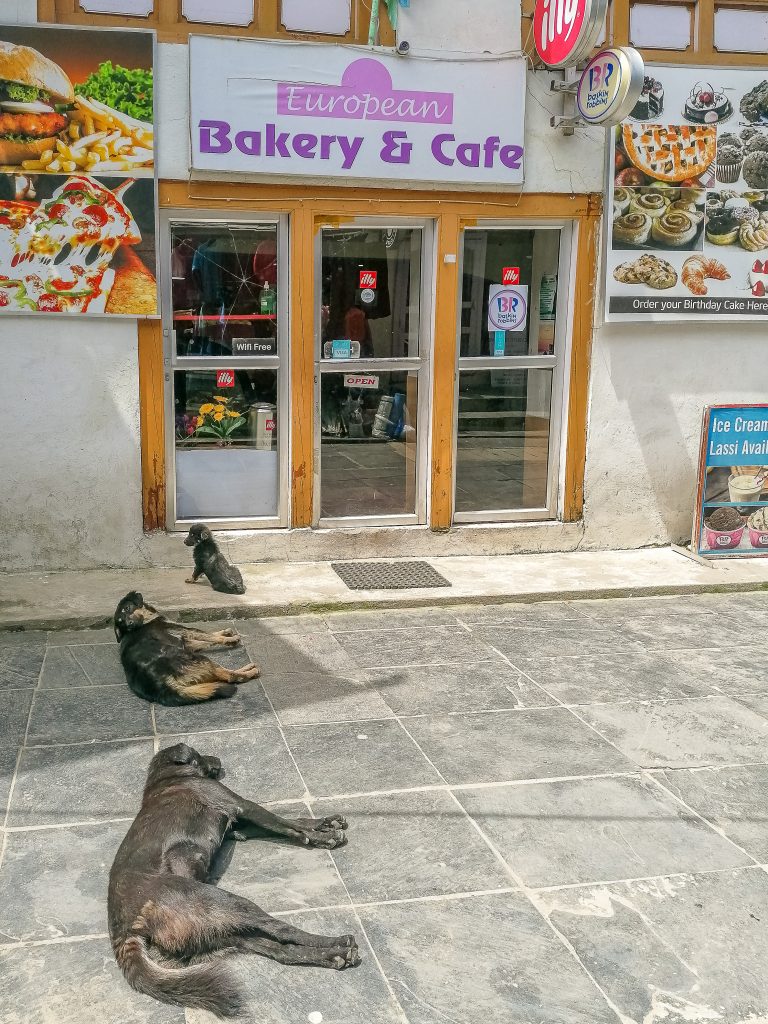
Only in Lukla, dogs waiting in line for donuts
Let’s take a look at all fixed and flexible factors that influence the price of trekking to Everest Base Camp.
Keep in mind that the best time of year to go to Everest Base Camp isn’t necessarily the least expensive.
Nepal Visa Cost – Fixed & Mandatory
The only visa you need to enter Nepal is the Tourist Visa On Arrival, which costs as follows:
- 15 Days Nepal Tourist Visa: 30 USD
- 30 Days Tourist Visa: 50 USD
- 90 Days Tourist Visa: 125 USD
For the Everest Base Camp Trek with Cho La Pass (which requires a minimum of 16-17 days in Nepal) you’ll need the 30 Days visa, so you can budget 50 USD.
Total Visa Cost: 50 USD
EBC Trekking Permits Cost – Fixed & Mandatory
There are two permits you need for completing the EBC Trek:
- Khumbu Rural Municipality Permit: 2000 NPR (~ 15 USD) per person
- Sagarmatha National Park Entry Permit: 3000 NPR (~ 25 USD) per person
Total Trekking Permits Cost: 40 USD
Travel Insurance Cost – Mandatory
Travel insurance with altitude and helicopter evacuation coverage is mandatory for the Everest Base Camp trek. Depending on your country of residence, you may be able to buy it from World Nomads or not. As this company doesn’t include insurance for Romanians, we had to find the right insurance elsewhere.
We joined the Romanian Alpine Club (CAR) and we were able to purchase the right insurance policy at a rate of ~ $3 USD per day.
I assumed I might spend 21 days abroad.
Total Insurance Cost: 70 USD
Cost of Flying to Kathmandu, then to Lukla and Return
Our Bucharest – Kathmandu – Bucharest flight with Turkish Airlines cost about 720 USD per person. We had booked it about 4 months in advance.
Local airplane flight Kathmandu-Lukla-Kathmandu cost: ~ 310 – 320 USD
We booked it in November to fly late April, beginning of May. We used a local agency to make this booking – this was a real life saver later on, when we had our schedule messed up by Turkish Airlines. Kedar, from Actual Adventure helped us change the date on our tickets (and also arranged for us to get on a helicopter to fly out to Lukla).
In case of bad weather, there’s the option to shed $200 USD more (one way) to get helicoptered into Lukla. We were in this situation and we preferred to pay rather than taking the risk to have our trek postponed by one day.
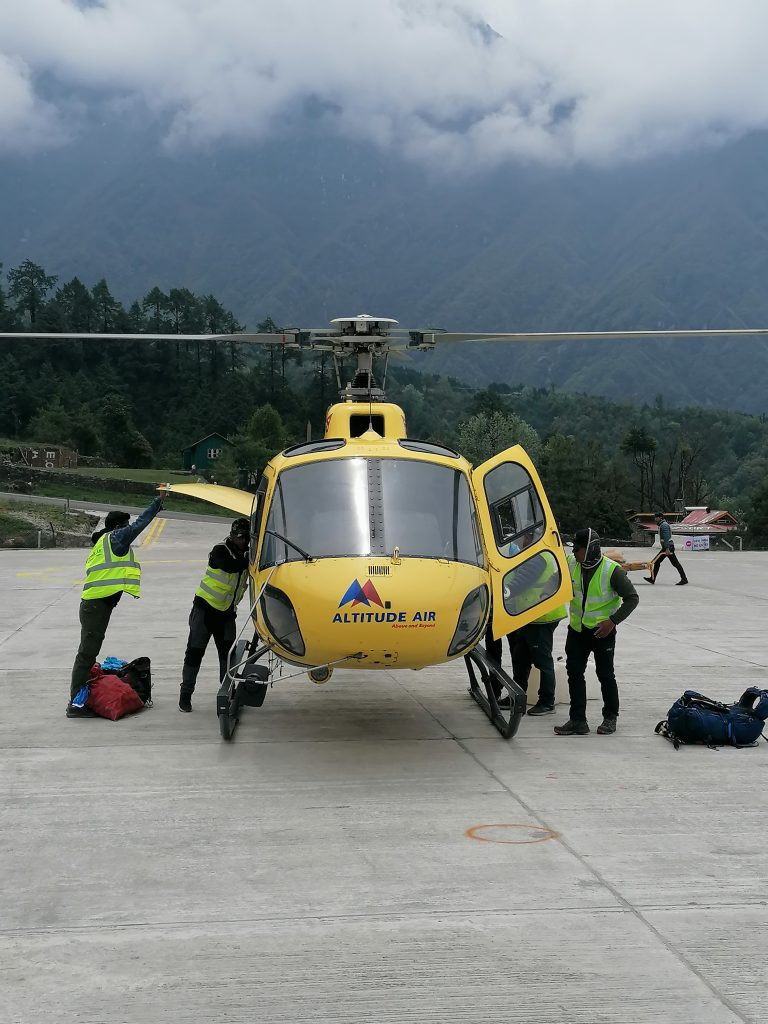
It is possible to get from Kathmandu to Lukla without flying, but that would require three extra days. I don’t know how much this would cost.
Total Transportation Cost: 1240 USD
Kathmandu Accommodation and Food Costs
I highly recommend Kantipur Temple House, a hotel in Thamel, the commercial district of Kathmandu. The price of a room ranges between $50 – $60 USD per night (double occupancy).
For the sake of EBC Trek budgeting, I assume four nights in Kathmandu, all of them in this hotel. If you want to lower your costs, you’ll surely find decent hotel rooms in Thamel for as little as $10 USD.
Total Kathmandu Accommodation Budget: $240 USD / 2 persons -> $120 USD / person
The average price for a meal is about 600-1200 NPR (5 – 10 USD) per person.
Beer prices range between 150 NPR (1.15 USD) and 650 NPR (5 USD). The cheapest ones are 330 ml. Prices differ from one restaurant to another, so don’t take my numbers for granted. My most expensive beer in Kathmandu was 650 NPR. It was a strong, 650 ml, Gorkha Beer, containing 6% alcohol. I had it at a restaurant with live music, hence the slightly higher price, by comparison with less fancy restaurants where I had it for half this price.
Three meals a day times four days equals 12 meals. Let’s budget ~ $8 per meal (plus water and snacks) for a total of $100 USD for food in Kathmandu.
Tea House Accommodation and Food Cost
If in Kathmandu you can use your credit or debit cards to pay for your purchases, on the Everest Base Camp trek you’ll need cash in local currency. Make sure you take more cash than you estimate you’re going to need on your trek.
Namche Bazar is the last town before EBC where you’ll find ATM machines that work. Even so, many of them may be out of service, so you’d better take more cash in Kathmandu.
I had estimated my expenses very carefully, yet I ended up needing more cash in Namche Bazar. Even when I took cash from the ATM in Namche I thought I’d have enough of it for the entire rest of the trek, yet I was almost on the verge of not being able to pay for my food in Dole.
The tea house accommodation system goes like this: you get a room for almost nothing, provided that you eat dinner and breakfast in their restaurant. Furthermore, the higher you get, the more expensive everything becomes. While in Lukla you can get a black tea for 100 NPR or less, in Lobuche or Gorak Shep you’ll need to pay 200 NPR for a similar cup of tea.
If you trek with a guide, he or she will keep track of what you eat and drink at each lodge. The morning, just before you leave the accommodation, you’ll find out what you need to pay for your stay. This amount may range anywhere between 3000 NPR (23 USD) and 4000 NPR (30 USD), without any beer or alcohol of any kind, or even more (if you choose the most expensive things on the menu).
In addition, you’ll have 16 lunch or snack breaks to budget for. You’ll have at least one tea and one soup at each of these stops, so you’ll need at least 700 NPR times 16, namely 11,200 NPR (roughly 90 USD).
If you choose to drink bottled water, you’ll also need to add it to your budget. My figures include the water.
Considering 16 days of trekking, you’ll need to bring a minimum of 80,000 Nepalese Rupee in cash ($600 USD), plus the tips for your guide and porter (if needed).
Considering my experience, I’d say you should have the equivalent of $900 USD, which is around 120,000 NPR. You can spend what’s left in Kathmandu or exchange it back into USD before you fly out.
I spent about $800 on the trek instead of the $600 budgeted. Fortunately, I realized that I needed more while in Namche Bazaar, so I was able to withdraw NPR from ATM machines there.
I included the porter and guide tips in these $800, just to warn you that you do need to budget for this amount when you prepare your cash for the trek.
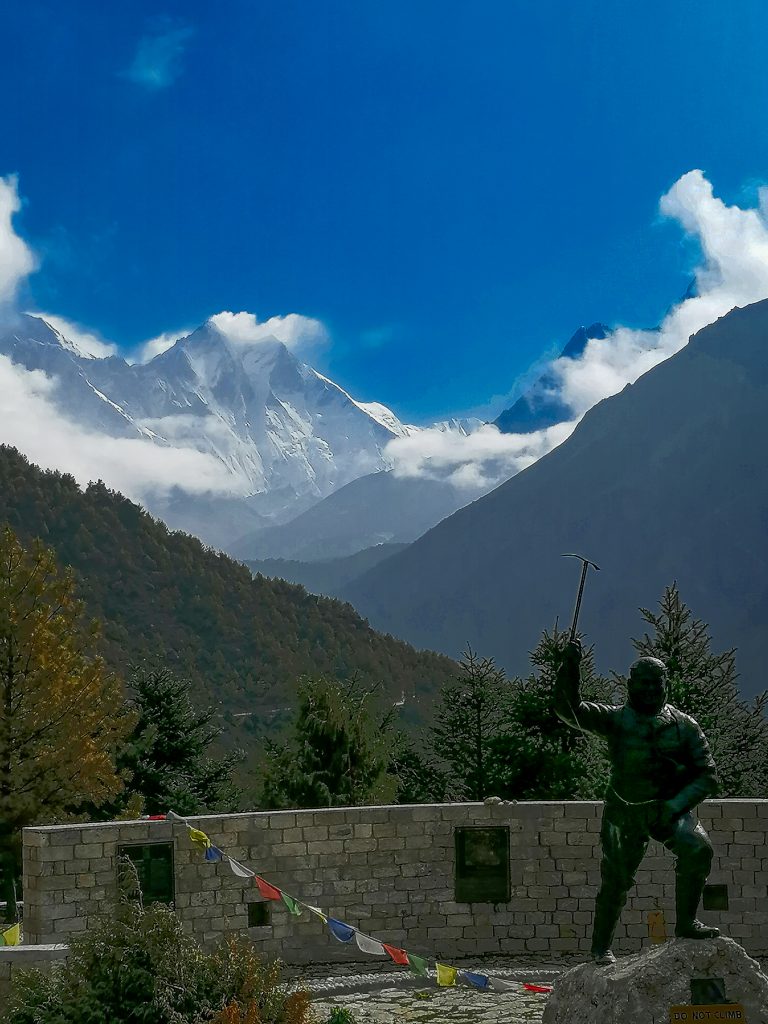
The statue of Tenzig Norgay at Everest View Hotel
Things I bought without budgeting for them on the trek:
- microspikes – 2000 NPR
- a second buff to wear on my head as sun protection – 150 NPR
- two rolls of toilet paper – 900 NPR
- chocolate bars for the road – 2000 NPR (I could have bought these for much less in Kathmandu, but I didn’t believe I’d need them)
- internet access in Lobuche and Dzongla – 1000 NPR
- three showers (the first one in Namche Bazaar, the second one in Dingboche, and the third one in Namche on the return way) – 1800 NPR
- lots of beers, coffee and apple pie in Lukla, after the trek – 3000 NPR
- one extra day in Lukla (food + accommodation) – 3000 NPR
Total additional expenses: 13800 NPR (~ 100 USD)
Water Costs on the Everest Base Camp Trek
If you choose to buy bottled water on the Everest Base Camp Trek, take into account that the one-liter water bottle that costs 80-100 NPR in Lukla will cost you 200 NPR in Namche Bazar, 300 NPR in Dingboche and Tengboche, and even 350 NPR in Gorak Shep.
You’ll need to drink at least three liters of water per trekking day. The 50 liters of water you’ll drink over the 16 days will cost you about 15,000 NPR (115 USD). This amount is already included in my expenses. I just want to show you how much money you can save by getting a Steripen or water purifying tablets.
Trekking Equipment Cost
The cost of your trekking gear depends on your lifestyle and on the pieces of equipment you may already have. If you do like hiking and mountaineering, chances are you already own a good backpack, sleeping bag, solid trekking boots, merino layers, insulating gloves, trekking poles, etc. If you want to know more details, check out my Everest Base Camp Trek packing list.
Overall, I think I spent about $1000 USD to complete my equipment. I already had one pair of boots, one pair of trekking pants and a rain jacket. I borrowed the sleeping bag. Also, I had enough time to wait for discounts.
If you need to buy everything from scratch, you can easily spend between $2000 and $3000 USD.
EBC Trek Porter and Guide Cost
One porter and one guide cost us $800 for the entire period. We shared this cost between the four of us.
My share was $200 USD. I added a bonus for their excellent service. We all did. Tips are expected, so make sure you do have some cash for that by the end of your trek.
My Total Cost for the Everest Base Camp Trek
- Visa: $50
- Trekking permits: $40
- Travel insurance with altitude & helicopter rescue coverage: $70
- Kathmandu food & lodging: $200
- Trek food & lodging: $700
- Porter and guide (my share): $300
- Local flights (Kathmandu – Lukla – Kathmandu) helicopter in, plane out: $520
- International flight Bucharest – Kathmandu – Bucharest: $720
TOTAL: $2600 USD
We slept in basic tea houses with no heating in the bedrooms and with shared toilets.
The accommodation cost was $2 – $5 per night. If you can’t do without heating and en-suite bathroom, teahouses are not your cup of tea. Go for luxury accommodation instead, but expect to pay $150 – $200 USD per night.
Menu Prices in Different Tea Houses on Everest Base Camp Trek
Here are a few menu samples from various tea houses in Gorak Shep, Dzongla and Lobuche, for you to get a gist of the Everest Base Camp Trek costs.
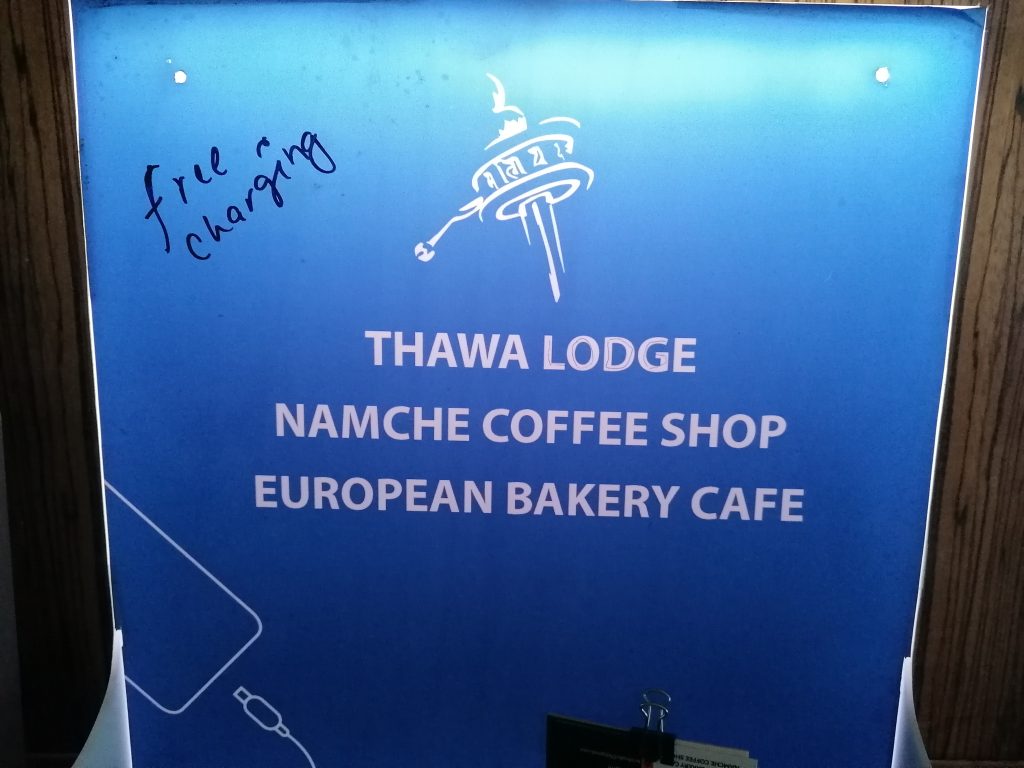
Thawa Lodge Namche Bazaar – excellent accommodation, free phone charging, working shower (not free), excellent hosts
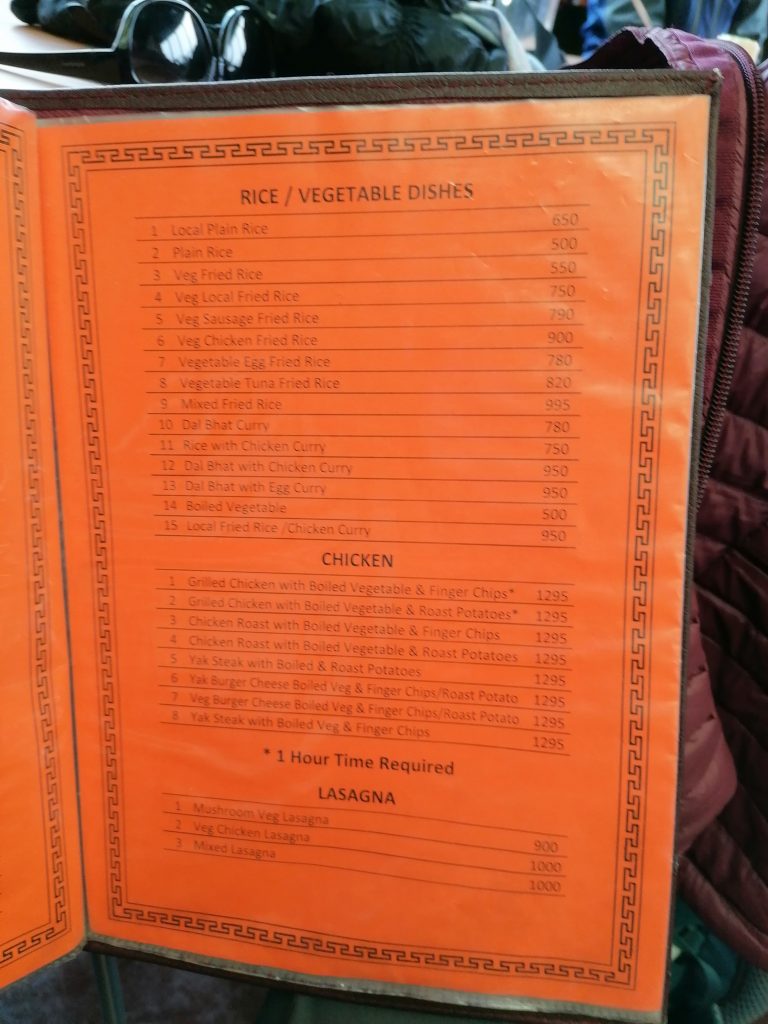
Lobuche menu – rice dishes
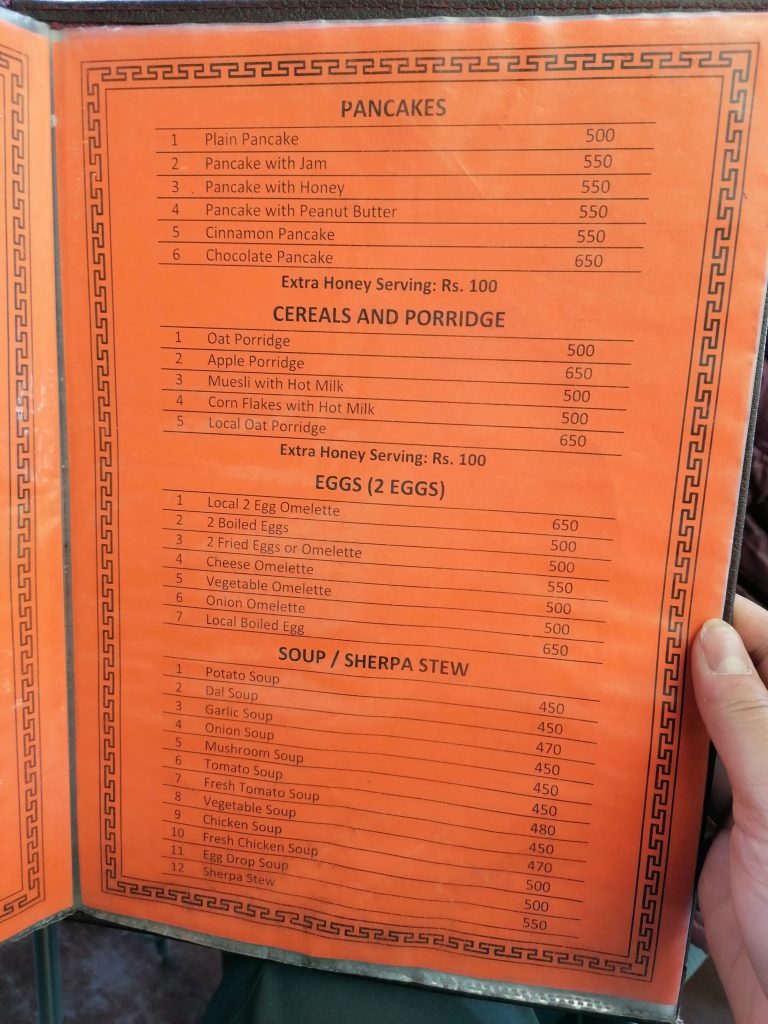
Lobuche – eggs, cereals, pancakes and soups menu
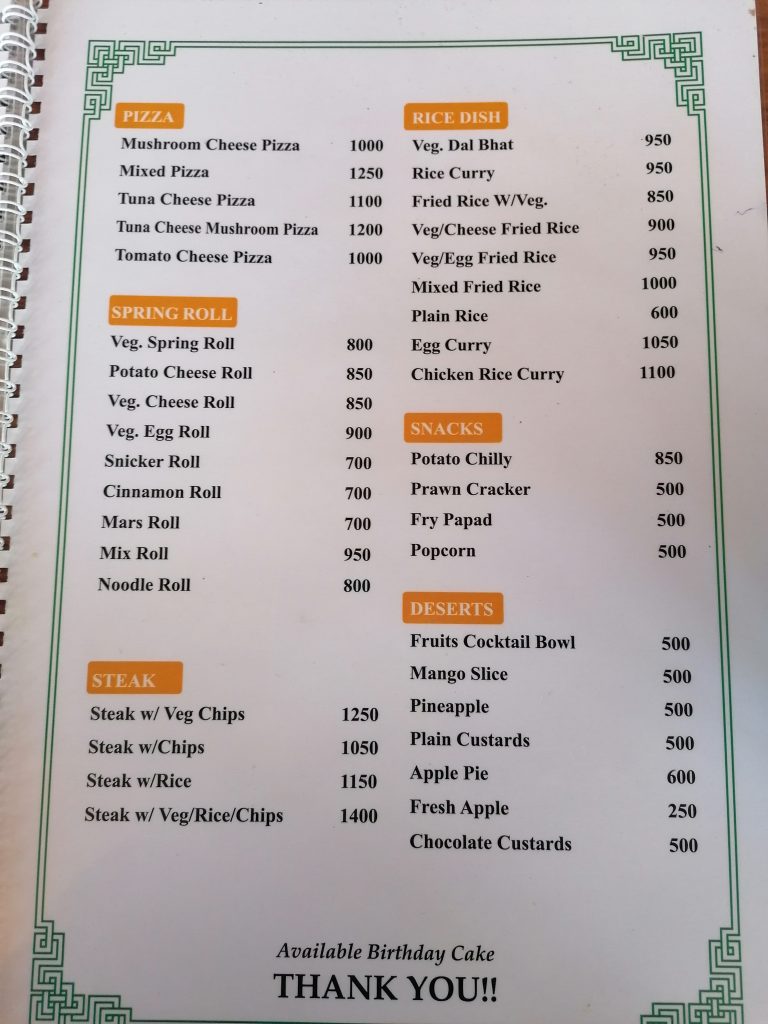
Gorak Shep Food Meniu with Prices
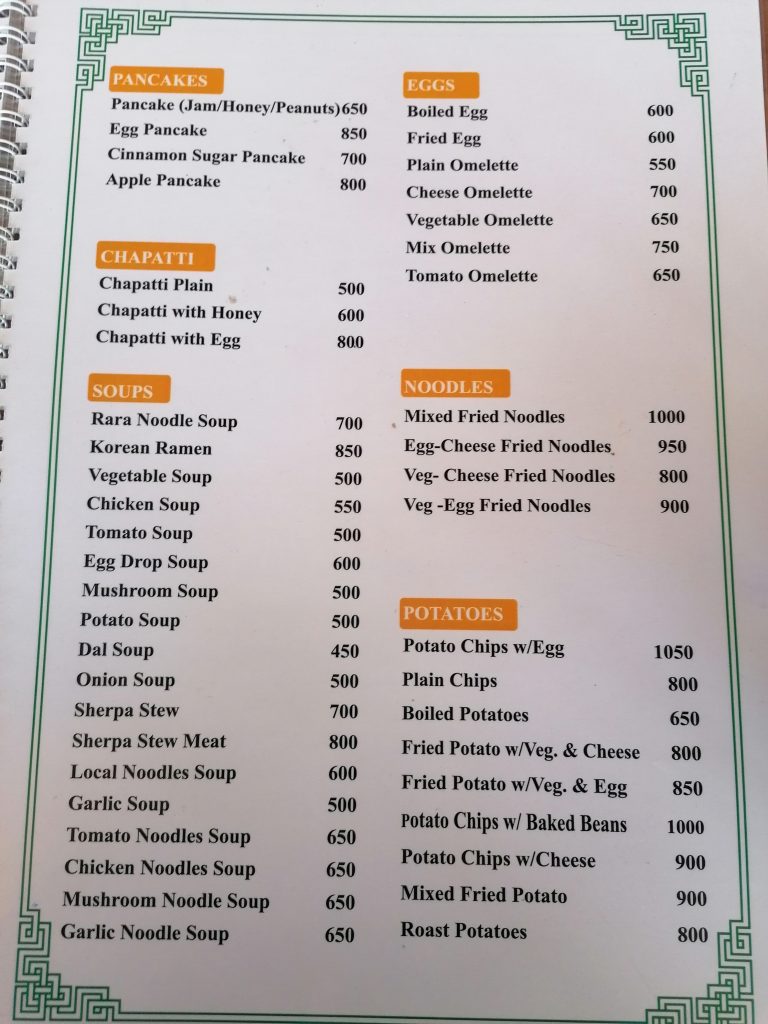
Gorak Shep Menu with Prices
- Ramla Beach Gozo, Maybe the Best in Malta - April 9, 2024
- Where To Go on Honeymoon: List of the Most Interesting Countries - April 9, 2024
- A Guide to Nepal Treks from India - April 5, 2024

